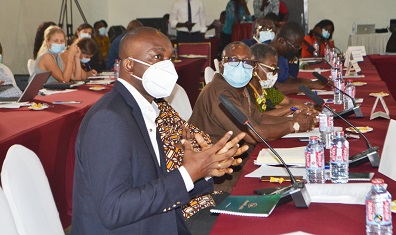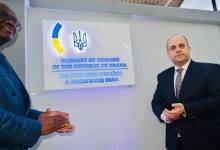
Panellists at a forum on corruption have argued that the practice where punishment on corrupt officials is not made public is hampering the fight against the canker.
They have, therefore, called for a reviewed approach to focus on publicising sanctions against corrupt public officials in fighting corruption.
The panellists include Mary Awelana Addah, Programmes Manager of the Ghana Integrity Initiative (GII), Professor Godfred Bokpin, an Economist and Dean of Students at the University of Ghana, President of Ghana Institute of Procurement and Supply, Collins Agyeman Sarpong and Kofi Bentil, Vice President of Imani Ghana.
They were speaking at the 6th IMANI and the German Cooperation (GIZ) Reform Dialogue Series (RDS) on the theme “Risk of corruption to entrepreneurial and business growth in Ghana.”
It followed a survey conducted by Imani Ghana which identified procurement as the centre of corruption in Ghanaian institutions, resulting in the state losing US$3 billion annually.
Madam Addah explained that, although institutions had internal mechanisms in executing sanctions on corrupt officials, it was imperative that those sanctions were made known to the public to deter and encourage the public to report officials who they had caught engaged in unprofessional conduct.
Referencing the Ghana Police Service, she noted that the Police Intelligence and Professional Standards Bureau. (PIPS) was doing a fine job in applying sanctions on officers who went wrong.
However, these sanctions, she said, were carried out discreetly, a situation that created a general impression that the police administration did nothing about errant officers.
“We have code of conducts for most of the public sector institutions which spelt out punishment and sanctions for non compliance and breaches of the law.
It is unfortunate reports on these internal sanctions meted out to defaulters are not made public. Making it public will serve as a deterrent to others who would want to engage in corrupt activities,” she added.
She further called for a revision of Ghana’s democratic practices saying “it was breeding corruption especially when we look at the area of political party financing.”
Professor Bokpin noted of the need for cultural re-orientation as current practices suggested corruption was acceptable.
He said educational reforms should include highlighting of corrupt practices and its attendant consequences for young people to be abreast of the negative impact of the canker on nation-building.
He said a tightened sanctions regime was necessary in the face of growing incidence of corruption, which had both local and international dimensions.
Another panellist, Mr Sarpong decried the ineffective implementation of the whistleblower’s Act adding that “if people do not feel safe to report a crime, they won’t.”
He, therefore, charged the appropriate authorities to ensure that whistleblowers were protected to encourage Ghanaians to report crime.
He attributed the failure of procurement officers to work efficiently to the unjust transfer of officers who avoided corruption.
On his part, Mr Bentil asked Ghanaians not to give up in fighting a canker that was denying the country of much-needed development.
“We are frustrated but we cannot throw ours hands up in the air and say it doesn’t matter. Today, 30 per cent of the drugs we buy are fake and that will kill us if we don’t put systems in place to deal with corrupt practices,” he stated.
BY CLAUDE NYARKO ADAMS







